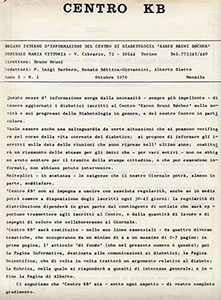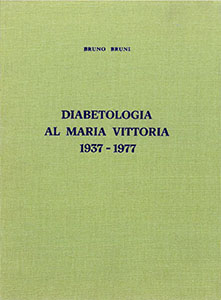"Science must begin with myths, and with the criticism of myths; neither with the collection of observations, nor with the invention of experiments, but with the critical discussion of myths, and of magical techniques and practices."
Karl Popper
Bruno Bruni
Prof. Bruno Bruni passed away at home on 16/06/2006

The development of the Diabetes Museum was closely connected to the history of both the private and professional life of Professor Bruni which took place almost entirely within the Maria Vittoria hospital and, after his retirement, continued in the headquarters of the Karen Bruni Bocher Diabetes Association in via Avigliana in Turin.
It was the curiosity of Prof. Bruni, in addition to his undeniable cultural expertise, that led to the creation of the Diabetes Museum. The birth, development and structuring of the Museum reflect the various phases of Bruni's work, as demonstrated by the numerous documents collected.
Bruno Bruni was born in Pavone Canavese on 12 May 1923; he studied classical studies at the "Galileo" in Florence; he graduated in Medicine in Turin in 1947 and obtained a teaching position in Endocrinology at the University of Turin.
He lived in Paris, Copenhagen, and Germany. Assistant in the Institute of Microbiology of the University of Turin (Director: A. Azzi) until 1954.
From assistant to clinical director in the first Italian hospital diabetology department (opened by Catullo Fiorio in 1936, at the Maria Vittoria Hospital in Turin), he mainly dealt with the relationship between the psyche and diabetes and information-education "seen from the other side" as well as insulin immunopathology.
In 1954 he helped set up the Piedmontese Section of the AID (Italian Association for the Defense of the Interests of Diabetics), with Salvatore Fiandaca, organizing the "Diabetes Days" in Turin in 1957.

From the early 1950s, diabetes was understood by Professor Bruni not as a chronic disease but as "conditioned and guided health" according to a new model of technically and psychologically committed assistance to diabetics.
In 1953-1954 he met the Danish physiotherapist Karen Böecher, who became Karen Bruni Böecher in 1955, who died tragically in 1975.
In 1982, in her memory, he founded - with a group of young people - the "Karen Bruni Böecher Diabetology Center Association" (KB) with private legal entity, first at the Maria Vittoria hospital then at its own headquarters in via Beaumont 72, Turin. Publisher of the independent popular periodical "Centro KB" which lasted 28 years (Collaborators: Pierluigi Barbero co-founder, Alberto Blatto, Raffaele Castellazzi, Anna Bruni).
There he completed an information programme for the self-control and self-management of diabetes with a series of original video films, up to "Psychological Compensation for Diabetes" with Anna Bruni (1996).
Then he established the "Diabetes Museum" in 1989, collecting various documentary material on the history of diabetology, accompanied by a specialized library of over 2000 titles and including many ancient, valuable and rare volumes.
He also published (Edizioni Centro KB) the monographs “Il Museo del Diabete” (1995) and “A Short Story of Diabetes Mellitus” (1997), on CD Rom in 1999. He created a filmed version in three videocassettes on the history of diabetics, before and after insulin.
Grandson of the psychiatrist Vitige Tirelli (1866-1941), he put the archive together, currently located at the State Archives of Turin, after having edited with Karen - in 1971 - the printing of "An Unpublished Atlas of Clinical Psychiatry by Vitige Tirelli” (Milan, Hoepli). He also published – Edizioni Centro KB – “The anatomical-pathological laboratory of the Royal Asylum of Collegno (1996). In 2003 he created a “History of the Maria Vittoria Hospital in Turin” on CD with Anna Bruni and Maurizio Carlini. He produced 267 publications with various co-authors.
The Diabetes Museum, the only one in Italy, places its considerable potential, largely unexplored, at the disposal of scholars of diabetes and the history of medicine.
The issues of KB
Kb books


